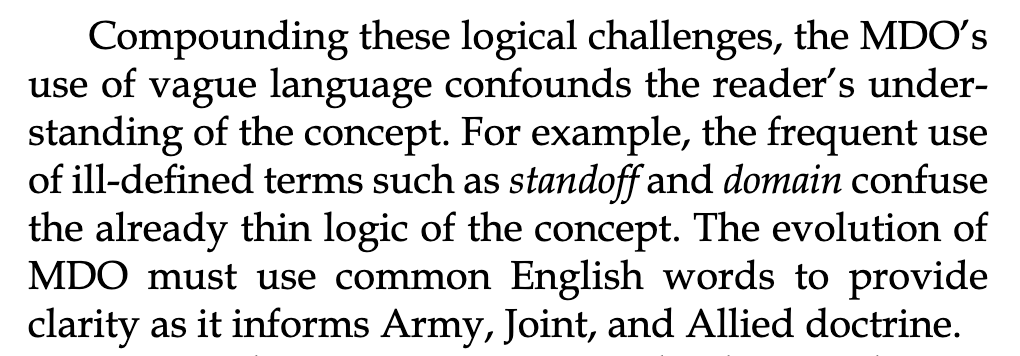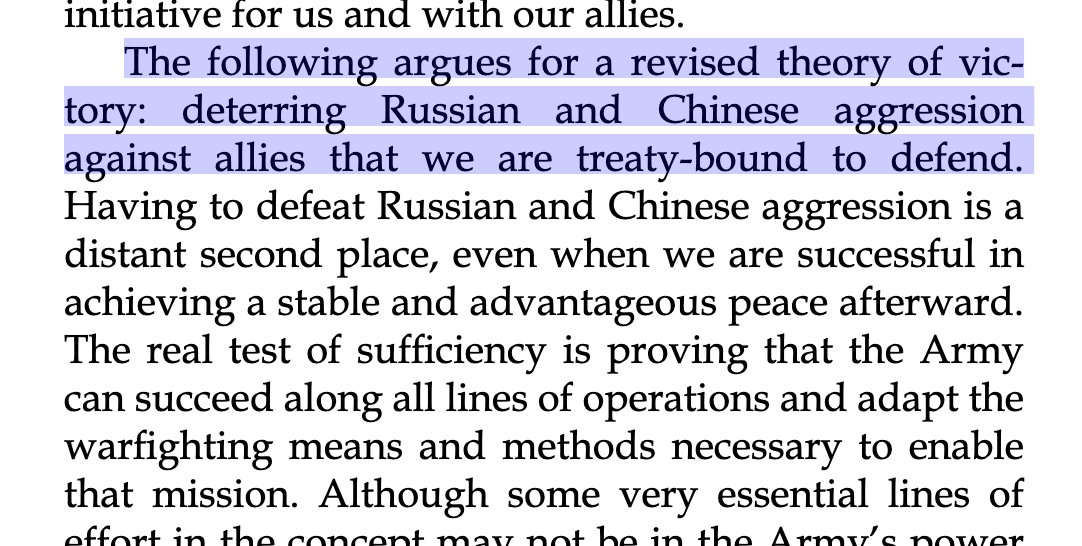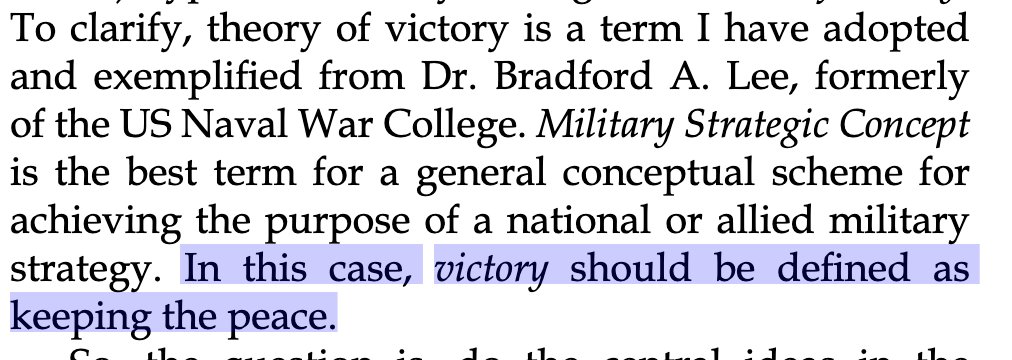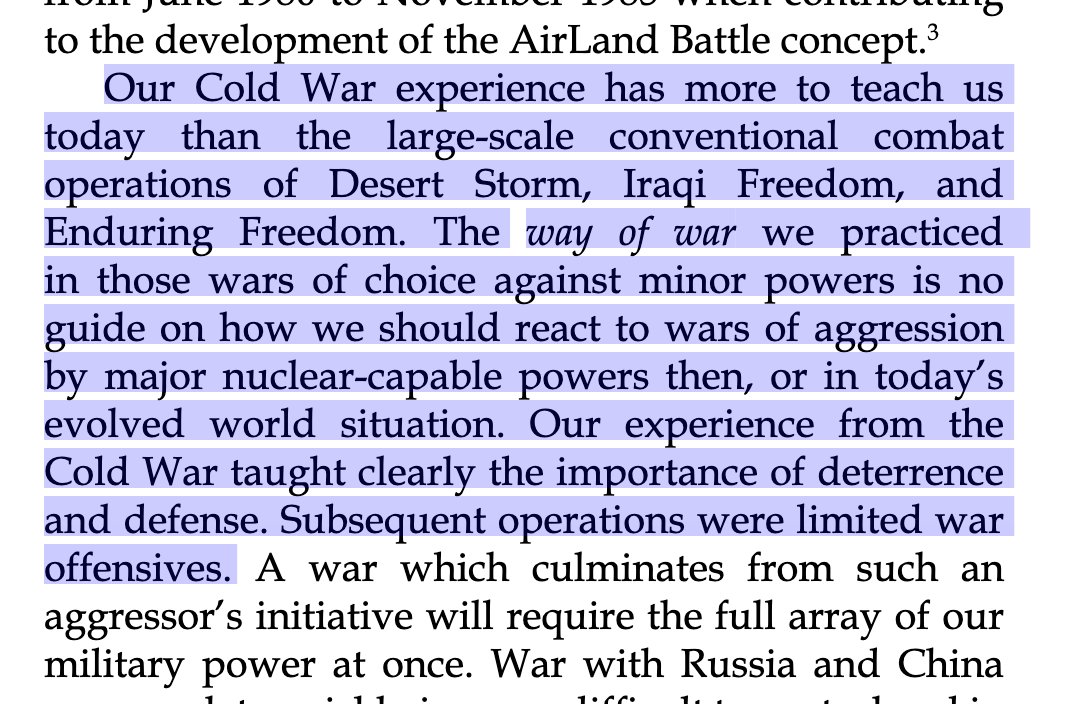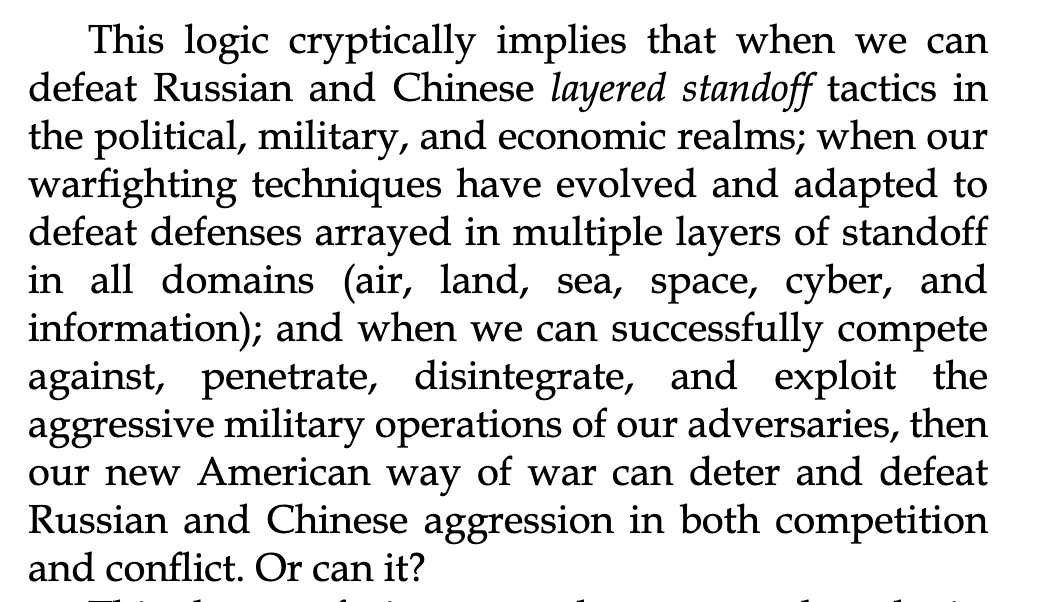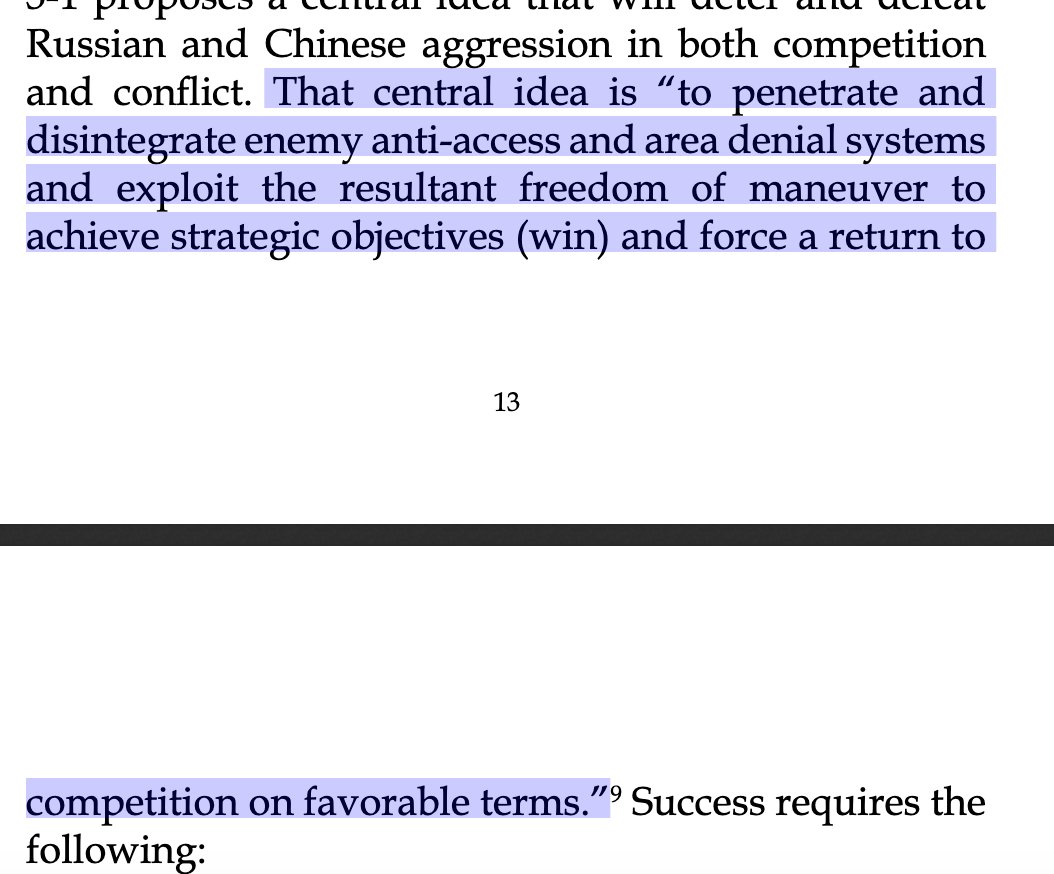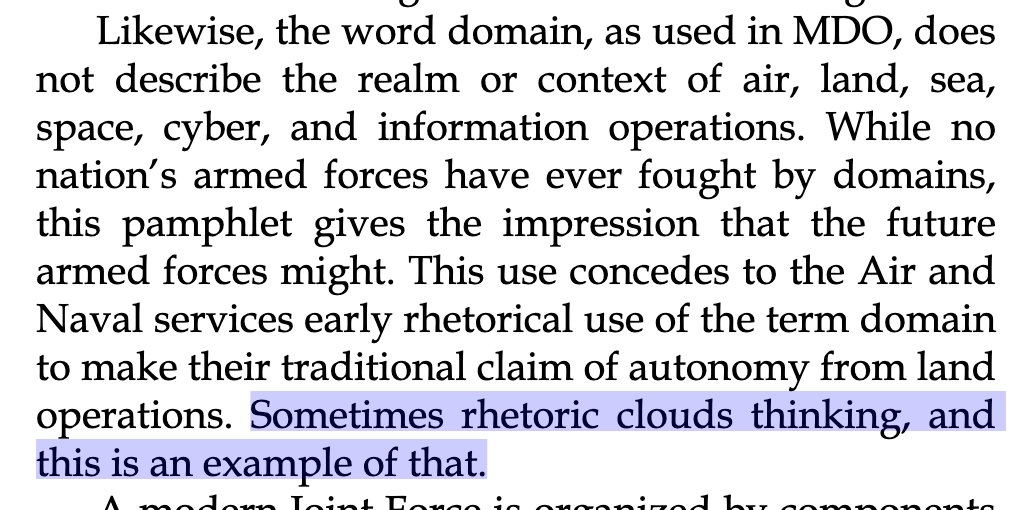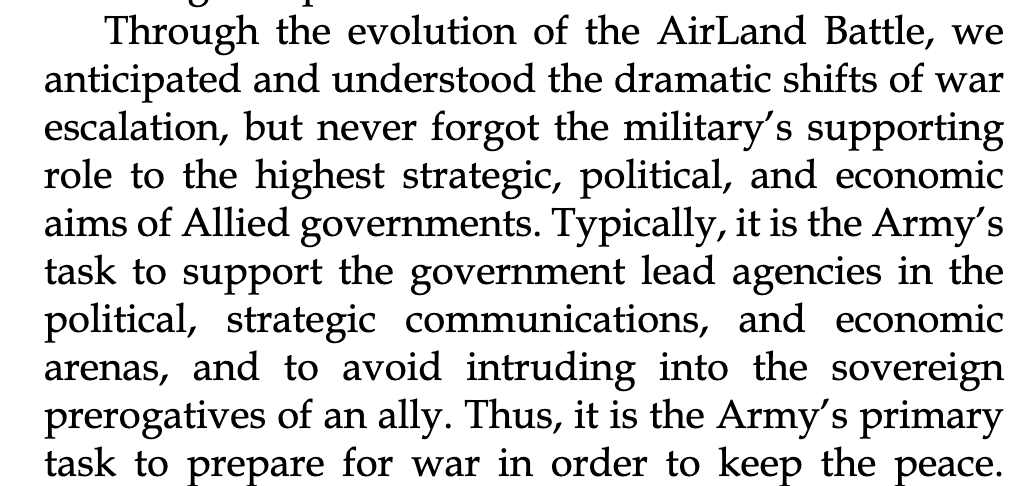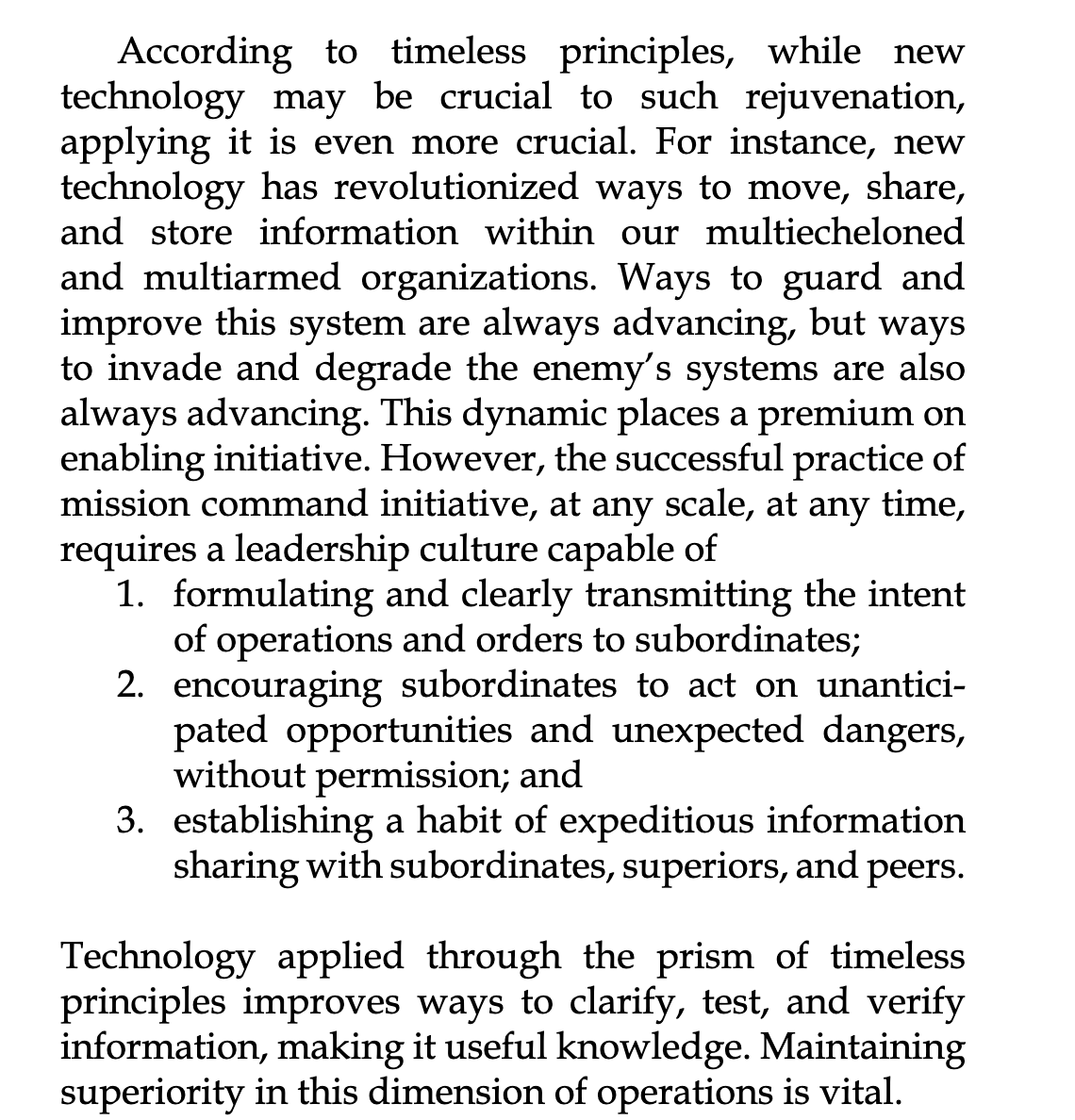1. Now reading Wass de Czege's explosive response to the TRADOC pamphlet on Multi-Domain Operations I wrote about in a monster thread on Dec. 28. Wass de Czege was one of the big thinkers involved in Army doctrine evolution in the 80s-90s. h/t @jonpwong https://publications.armywarcollege.edu/pubs/3726.pdf https://twitter.com/MichaelShurkin/status/1343592255874076672
2. He was involved in Army After Next, I believe, which was a 1990s attempt to rebuild the Army in light of RMA, etc.
3. One thing I like right off the bat is WdC's insistence in trying to gound an operating approach in the context of deterrence and nuclear weapons, which I think was absent in the MDO doc. Basically, we need to revive some of the theory at least from the Cold War.
5. Ouch: "Chapter 2 of the MDO, 'The Operational Context,' does not articulate a well-developed theory of the prob-lem. " ... "Likewise, MDO’s chapter 3, 'Multi-Domain Operations,' fails to articulate a clear solution to the mil-itary problem. "
7. This point nails it: MDO points to the varied nature of the Russian/Chinese "threat" yet ultimately wishes to reduce it all to a conventional and symmetrical contest of weapons systems and military capabilities.
8. Although WdC also seems to be ducking the whole thing about political and information warfare in preference for focusing on the military contest. To be fare, that is a more appropriate focus for the Army.
9. Pause to drive child somewhere :)
10. I'll need to think about this definition. It's contrary to definitions of strategy we've seen from Clausewitz, Beaufre, and many others. But in the context of nuclear weapons, it might be right. It does have an advantage...
11. That I think WdC is seeking over MDO: MDO is too broad and undisciplined about its ambitions for what the Army can do, so I think WdC is trying to deal with that by scoping down Army ambitions. In other words, forget about global competition; focus instead on the...
12. ....more concrete task of generating a conventional deterrence. That then becomes a more realistic goal for the Army.
13. I really like this: The Cold War was a better analogue for what's going on than Desert Storm, and other more recent conflicts. It's all about deterring war. Likewise, so much of the tech focus of the Army comes out of thinking spurred by Desert Storm (RMA, etc.)
14. That paradigm represented by Desert Storm lends itself to a search for high-tech solutions while neglecting consideration of larger political matters. Not to mention the threat of nuclear Armageddon.
15. There's a nice brief discussion of post-Vietnam, post-Yom Kippur war efforts to revamp US conventional forces largely by reframing the perceived threat represented by Warsaw Pact forces and thereby coming up win new ideas about how to deter them.
16. I often forget how huge the Yom Kippur war was for the US Army in terms of institutions, doctrine...it's at the core of TRADOC's mission, historically. Is there a book about that? Should be. There, I've just given someone a PhD thesis topic.
17. Again, a rephrasing of an important failing of MDO, which has to do with the expectation that developing military capabilities to counter A2AD somehow also counters non-military forms of competition, i.e. political and economic. I don't think WdC spends enough time on this.
19. Right: MDO means that being able to penetrate and degrade the adversary's A2AD solves for competition and conflict.
20. I keep thinking of Beaufre's discussion of how Hitler was able to pull of his "artichoke maneuver" to grab the Rhineland or CZ first by careful political and diplomatic work to shape the environment, such that when he finally pulled the trigger on a military move...
21. ...the military part was virtually guaranteed to succeed, and would be so fast and complete as to present the international comty. with a fait accompli.
22. Beaufre thought part of the problem was a lack of a real conventional deterrence capability. France couldn't project force, and couldn't mobilize short of a full national mobilization. So FR did nothing. Of course, there was also a political problem having to do with will.
23. MDO in a way wants to fix that problem by improving the Army's conventional response capabilities. We, too, can act super fast to slap down the next invasion of CZ (I'm mixing historic metaphors, I know, forgive me).
24 But would that be the end of it? I'd argue that MDO (specifically C-A2AD) would thereby solve part of the problem, but only part, but MDO doctrine as written doesn't recognize the limitations
27. pp. 21-23 are interesting. WdC pulls out his Clausewitz as part of an argument about how we have to think asymmetrically about how to counter adversaries' asymmetric acts. Here I think he does better than MDO, whose answer to everything seems to be Army long-range fires.
28. Still, there's some limited thinking here. Beaufre still did it better.
29. Oh, yeah. Pp. 26-28 are, as the kids say, money. WdC gets into how so much of R and C aggression have to do with "information warfare" and other forms of "short of war" aggression. Dealing with these is not really an Army task, and the Army...
30. ...has to remember that its proper place is in supporting other lead agencies, focusing itself merely on the warfare piece without losing sight of the limitations of that.
31. Much of the rest of the doc largely consists of WdC's attempts to rephrase MDO objectives in more coherent language reflecting a more coherent way of thinking about the problems MDO identifies. I won't rephrase here, but he does an impressive job.
33. And it nicely tees up the article on Hubin that I've got in the pipeline, since that's sort of his shtick.
34. I think I'm done. WdC's clearly a really smart guy. Next!

 Read on Twitter
Read on Twitter
